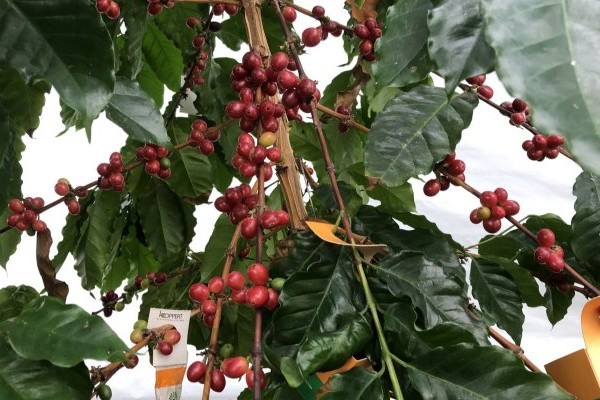"You're the third this morning," said Filip van Noort of Wageningen University & Research on Wednesday morning, answering the phone. He can guess what the question is: What is the state of greenhouse coffee cultivation?
After all, experts are predicting problems in coffee cultivation because of climate change, resulting in increasing weather extremes. Among others, Nieuwsuur published about it after a price hike this week in the price of Arabica beans, fearing frost in Brazil.
Coffee is a sensitive crop. You can control the climate better in a greenhouse. Some years back, WUR already did research into greenhouse cultivation for coffee producer Douwe Egberts. That research has not yet been followed up, but the current crisis may well speed things up, researcher Filip expects. He shares that he is working with 'someone' to follow up the earlier research.

Image from previous WUR research on greenhouse coffee cultivation.
Mountainous areas
In that research, the focus was on whether flavour and contents of coffee beans can be controlled with growing conditions, in addition to finding out at all whether coffee can be grown in the greenhouse. "Back then, I said that greenhouse cultivation is not going to take over the coffee market in the Netherlands. And I'm still leaning towards that. But maybe it is time to start looking seriously again at whether it is interesting to grow coffee in the greenhouse somewhere in the world."
Worldwide, nearly 10 billion kilograms of coffee are produced every year. For countries like Brazil, Colombia, Guatemala, Ethiopia and Vietnam in particular, coffee is an important export product. Are those countries also the regions where cultivation could be covered in greenhouses? Filip says it's hard to say yet. "Where high quality coffee comes from now, they grow in mountainous areas. It won't be easy yet to start growing in greenhouses there."
The researcher thinks it would be good to start imaging exactly what cultivation looks like in those mountain areas and whether it is possible to mimic that in other places.
Longer flowering period in a greenhouse
Previous WUR research showed that it is indeed possible to make a coffee bush bloom in a greenhouse, and eventually harvest the berries. The crop grows well in a relatively dark, humid and warm climate. Interestingly, the flowering period lasted longer in the greenhouse than outdoors: it managed to stretch from April to November, i.e. more than half a year.
It is clear to Filip that if you want to grow in greenhouses, production has to go up. After all, growing in a greenhouse is more expensive than outdoors, as is the case for many other crops.
Follow-up research
Filip emphasises that coffee really is a 'commodity' and that is why he does not see cultivation in vertical farms, where climate conditions can possibly be controlled even more than in greenhouses, happening so soon. "People will really start looking at it, but in a vertical farm you have to be able to grow even better than in a greenhouse."
From a research point of view, he does think growing in a vertical farm is interesting. "And then you can then make the translation back to growing in a greenhouse."
With the current interested party Filip is working with, a follow-up to the earlier research may well be on the horizon. If it comes to that, Filip expects it to be "fairly open research", just like research into growing cotton in greenhouses, among other things. So who knows, maybe a tour of WUR's greenhouses during one of the next public events will see a coffee crop again.
International developments
In California last year, a scientist also explored growing coffee in a greenhouse. In December 2023, Justin produced only a handful of beans, but it takes a few years for coffee plants to reach their full harvest. He hopes that in the second year, the harvest will be large enough to meet his daily coffee needs. In Finland, researchers are exploring the potential of cell culture, and a coffee-growing production greenhouse has already been completed in the United Arab Emirates last year.
For more information:
Filip van Noort
Wageningen University & Research
[email protected]
